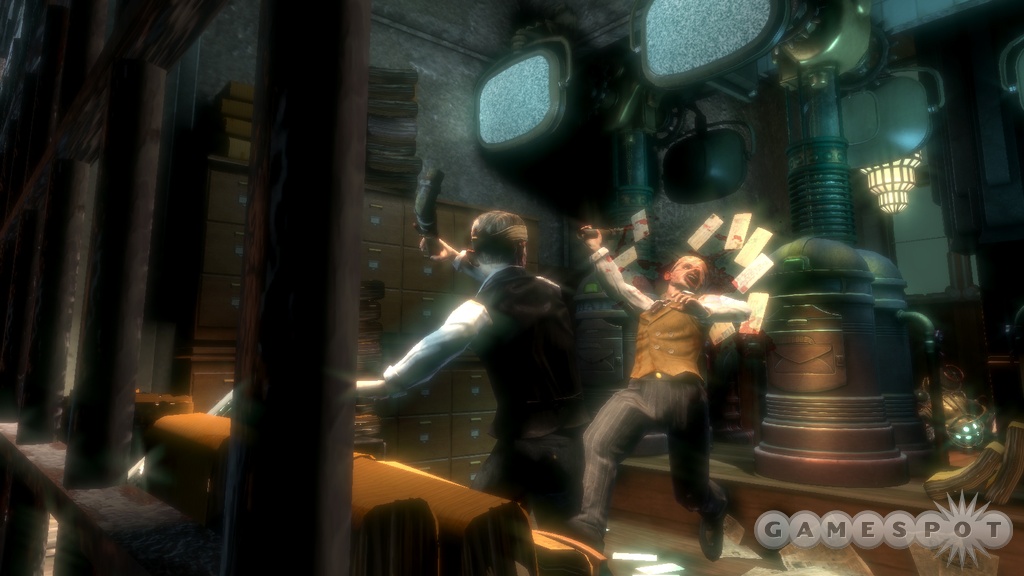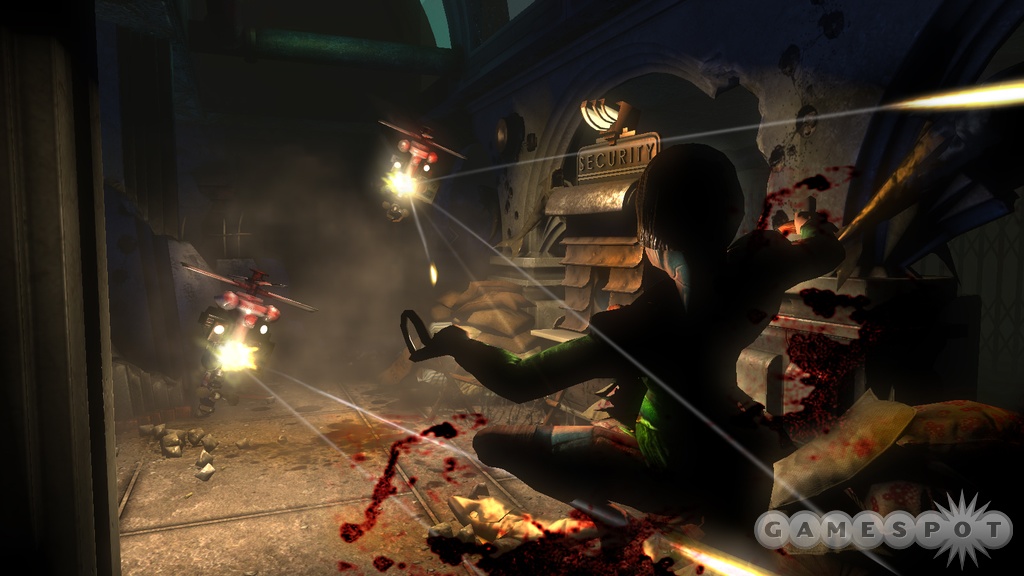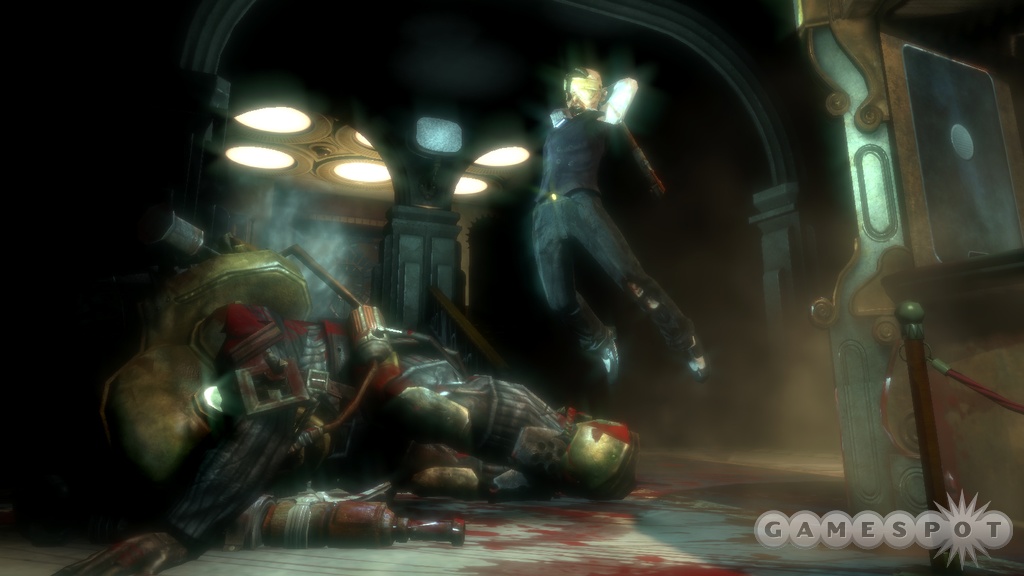BioShock Exclusive Q&A - Story, Emergent Gameplay, and Optimizing for the Xbox 360 and PC
We sit down with Irrational Games' general manager, Ken Levine, to talk story, characters, design, and gameplay in BioShock in this exclusive interview.
Irrational has made a name for itself by creating highly open-ended games that combine elements of action, role-playing, and stealth, among other things. The studio is now hard at work on its upcoming hybrid action game, BioShock, which will place players in the ruins of an undersea settlement in the mid-20th century. According to the game's story, the settlement, known as Rapture, was supposed to be a social paradise where the strongest, smartest, and most beautiful members of society went off to live under the ocean, free of strife (and all that pesky government regulation). Everything seemed to be going well, until the inhabitants of the undersea city discovered the secret of genetic manipulation through a substance called "adam," which the inhabitants began to use to augment their already-peak physiques and minds.

The result was a disaster that has ruined the city, turned many of its inhabitants into homicidal, mutant monsters known as "splicers," and left behind a bizarre, three-part ecology in which recycled genetic materials are sought out by splicers and harvested from the corpses of Rapture by young gatherers known as "little sisters," who are guarded by powerful soldiers known as "big daddies." The game will let players explore the city in the wake of its crisis, pick up genetic enhancements for themselves to grant them mutant powers, and use enhancements for their weapons to defend themselves using first-person shooter gameplay. Irrational general manager Ken Levine explains.
GameSpot: Give us a brief update on the game's development.
Ken Levine: Right now, our focus is on the levels--getting them fleshed out so we have a fully playable game from start to finish. Then, we can move on to balancing and tuning stuff, which we'll be spending a huge amount of time on, as you can imagine.
We're also really working on the artificial intelligence to get it to "think," because one of the coolest, and most challenging, things about this game is all the interactions that AI [characters] can have, because of all the relationships they have with each other. The more complex you make your AI, and the more things you enable it to do, the more you have to make sure it does those things well. And because it's so emergent, things happen all the time that make us say, "Whoa!" It's sometimes what we want, and sometimes we end up in the Land of Weird Bugs. So, we're putting in a huge amount of work into our AI...much more than on any other game we've ever done. But it's definitely going to be worth it.
GS: Let's talk a bit about the story. Tell us about the world of Rapture--what's the general level of technology, and in what time period does the game take place?
KL: The game takes place around 1960. It's hard to answer the question of exactly what level of technology is available in the world because it's not really concurrent with any actual historical progression. This is a society that split off from the rest of the world after World War II. But, these people also cut themselves off with the best and the brightest technologists of the time, and they went off to build this utopia called Rapture.
So, you have the best and the brightest people, and you have no government constraints on technology. There's nobody in the government scratching their heads about stem cell research or cloning--[the citizens of Rapture] just do it. It's the nature of the social system they have down there...which is "business first, business first, business first."
So, between the brilliant technologists, no government restrictions, and the discovery of this sea slug, "adam," (which can essentially make stem cells out of human cells) at the bottom of the ocean, [the citizens of Rapture] have gone in a different direction than, and far beyond, where general society was headed, in many areas.
GS: We understand that Rapture itself is more or less deserted, and that the whole place has started to break down. How will the damage to the city affect the gameplay?
KL: The primary thing that players will see is the visual tension between the idealized, beautiful city that was created, and what actually happened to it--how it's falling apart. We're not using the world to create the usual action game with destructible environments where you carve through walls as a major part of gameplay. We're also not making the kind of game that has tons of "water puzzles," because that's a little hackneyed. Just because you're under the sea doesn't mean you need gameplay like that--we're not making a Mario [platformer action] game or anything.
Water does have some gameplay elements, like how some levels and obstacles are laid out, but it's primarily a story theme and a visual theme... That's "Theme" with a capital "T."
GS: What can you tell us about the character one plays as in BioShock? Who is the player character, and why is he or she down there?
KL: You've been asking me this question for several years. [Laughs.] I think you even asked me that when we talked about BioShock when we first revealed the game on GameSpot. [Laughs.] I don't think I can give you the answer without ruining the story, though.
Deep Blue Sea
GS: We understand that the game will use "AI ecology" for its inhabitants in lieu of a bunch of scripted events. Can you give us any hints on what else the ecology might include besides the big daddies, little sisters, and splicers, or has most everyone who has survived whatever happened down there become one of these three creatures?

KL: Well, right now, there's, like, three different types of big daddies and, like, 10 different types of splicers--and that's just base character models, to say nothing of texture variations or any of the other things we talked about at E3. One thing we're doing differently with the splicers is, instead of having "the one with the pistol," we're building all these models of people, these citizens of Rapture who have been mutated, and we have the ability to give them any of the powers available in the game. So, you'll be able to observe their actions and get a sense of what kind of enemy you're facing, rather than just saying, "that's the guy with the red shirt--he throws fireballs at me."
There are also several dozen different types of AI behaviors, and there are three "meta-classes," the big daddies, the little sisters, and the splicers. But there are also survivors of Rapture that you interact with on a story level. On the gameplay level, one of the primary ways you'll interact with them is quests--they'll give you quests and things to do, and there'll also be a system that you can use to exchange goods with them through pneumatic tubes throughout the world. And they'll actually ask you for things, sometimes opportunistically.
So, all told, there are probably about 40 or so different basic types of AI interaction in terms of what characters can do--you can do some combinatorial math to see that there will just be tons of different types of interactions in the game.
GS: That's a great answer, and it touches on some of the things we'll follow up on in a bit.
KL: See, that struck me as a pretty convoluted answer, but I appreciate your saying it was "great."
GS: Tell us about the substance adam and how it works in the game. Will it act as a kind of currency? Will it always be in short supply?
KL: In the game, adam is the underlying currency that drives everything in Rapture, because it powers all the genetic mutations. It's the genetic fuel of the world, essentially.
There's lots of ways to get adam. The primary way is through the gatherers, because the only way that adam can be reused is when it's recycled through the bodies of the little sisters. So, they're essentially like little armored cars, carrying around the world's most precious resource, protected by the big daddies.
You use adam essentially like money, to buy everything. You use it in vending machines, when you hack security systems (it costs adam for that interaction)--it's everywhere in the world. According to our story, adam comes from an extinct sea slug. So, there are no more new sources of adam--the only way to get more adam is to recycle it from dead bodies. And that's what these little sisters do. But [the citizens of Rapture] ended up killing all the sea slugs in the process of all the troubles they had down there.
GS: Any concerns about how people might interpret the game's themes of genetic manipulation, especially considering how prominently genetics and stem cell research have figured in recent world news?
KL: You know, I don't see why video games should be excluded from commenting on current issues the way other types of media do. So I don't have any concerns about that. But really, I don't think we're making "the game that will blow the doors off of stem cell research," either. It's really more about higher-level issues of ideology, and extremes.
I think if there's a theme, it's really about the danger of any kind of extreme ideology--left, right, whatever, and how we can end up caught in the middle of it. That's the role we're putting the player in, because on some level, that's kind of the role I feel that most of us are in, every day--caught between some people who are very much on the outer edges of certain beliefs.
GS: Let's get back to the gameplay. By the way, we're about halfway through this interview, so you can breathe a sigh of relief.
KL: Can I weep softly, instead?
GS: We'd like to remind you that this interview is being posted to the Internet, Ken. Anyway, are there going to be predefined character classes you can choose from at the outset, like in previous Irrational games, or just one generic type that you build on?
KL: You basically start from nothing. It's really up to the players [to determine] how they'll grow. As we've been developing the game, it's become clearer to us that our goal is to create the deepest shooter ever made. And I think for players who will play the game as a shooter, they'll naturally take on weapon enhancements and things that improve their shooting. And for players who want to go in a different direction--who want to get into hacking, who want to get into these plasmid powers and mutations--they'll explore that direction. It's very open-ended that way. We're not forcing players down any particular path.
The Jack of All Trades
GS: And about how many distinct strategies will there be to handle any given situation in BioShock? Brute force, stealth, hacking...?

KL: As I said--I don't really see this game as a role-playing game like Oblivion; we're thinking more in terms of the next generation of shooters. That said, for the people who do want to explore all the different gameplay systems, the options are limitless. Yes, they fall into basic categories that players can experiment with: There's weapons; there's the various plasmids, which offer a huge amount of expressability; there's hacking, which players can use on various machines in the game; players can even craft their own items if they want. Still, there's, like, a million different ways--tracks where you can make big daddies think that you're a little sister so they'll protect you; you can take over control of AI characters or security systems... You can pretty much do anything in the world, and pretty much anything you see, you can have some interaction with. You can also cause AI characters to have different interactions with other entities in the world in wacky and cool ways.
GS: Tell us about how diplomacy can be used solve any of the game's challenges, if it can be. How many living characters, which are articulate and sane enough to carry on a conversation, will be in the game, and how will your character's skills figure into these dialogues?
KL: I'm not a fan of dialogue trees, and I never have been. I think they're limiting in the sense that your options are always either A, or B, or C. I've never liked digital options--I've always liked expressability. I've always liked being able to choose by action, rather than choosing by pressing the 1 or 2 keys on a keyboard. So, we have, for instance, the whole moral range of the game--the big daddies, the little sisters, and the various other characters that have a stake in what's going on in the world. Some characters may encourage you to do things that may seem morally wrong, but there are advantages to do so for the player. But then, there will be other characters who will try to show players a different way to deal with situations, and encourage and reward you differently for not exploiting or hurting the little sisters. And there are different rewards that you'll get for that behavior--for both kinds of activities.
GS: How many different endings will the game have? How will they be different?
KL: I've never written multiple endings [for a game], because how many endings of games are actually any good? Also, writing one good ending is tough enough, let alone writing multiple endings. I'd much rather give players a huge amount of choice about how they get there, rather than where they get. That's not to say that the game and its endings won't raise some new questions, as well as answer others.
GS: Aside from seeing the end, how will the game encourage replay value? Is the idea to encourage players to experiment with different skills and abilities? Will the game reveal only a part of the story on the first play-through?
KL: Just like a lot of our other games, with BioShock, playing the game with one particular play style will be an entirely different game [than you'd experience with] another play style. Like with a lot of games that are out there now, like Mercenaries, World of Warcraft, or Grand Theft Auto, you can have a totally different experience each time you play. Also, because the missions in those games have free roaming in them, you have the option to go back and do things you couldn't do earlier once your character is a little stronger. But the primary way [players will enjoy replay value] is just having a totally different experience by making totally different character choices.
GS: Tell us about what's being done with the game's interface. Has it changed much since E3?
KL: We didn't show a huge amount of it at E3. [I]t has changed a lot, [though,] and we've brought on a new interface artist. All the elements we had at E3 were placeholders, so we've basically started on the process of building the look and feel we want--a "period" feel, and a much more analog feel, rather than flashing screens with a bunch of shiny vector graphics. We want the game to feel like an old-time arcade, before they had video games--where the games had an "electro-mechanical" feel. It's definitely the vibe we're going for now, and I think it's really working well, and I think we're on our way to making everything look alive...with buzzing electricity and lights, rather than a TV screen imaging a bunch of pixels.
GS: What are the main challenges of putting together an interface for a game like this for console controllers?
KL: Frankly, I think that, whether you look at something like Half-Life or Halo, or even Oblivion, there are ways to do good interfaces that have 70 percent of their functionality work across both [PCs and consoles]. However, you do see certain games making mistakes, like not supporting the use of a mouse. Our interface will support the mouse fully and be a mouse-driven game, because who wants to play a PC game that doesn't do that?
We have a layer of abstraction that separates the interfaces from the games, so that they don't need to be as closely tied together as the game content (which is much tougher to separate). The interface just sort of flies over the gameworld, so it doesn't really change the balance or anything. We're making sure the changes we're making are appropriate for the right platform.
The toughest area to do that in is in aiming and shooting, because, obviously, pinpoint aiming with a mouse is easier than pinpoint aiming with a controller. So, there are some balance issues there that we're working on, but in terms of actually messing with [computer] screens, and messing with [hacking] machines, and making growth choices for your character, we're pretty much customizing that per platform.
GS: Is there anything else you'd like to add about BioShock?
KL: No, I think that pretty well covers it. For now.
GS: Thanks, Ken.
Got a news tip or want to contact us directly? Email news@gamespot.com
Join the conversation